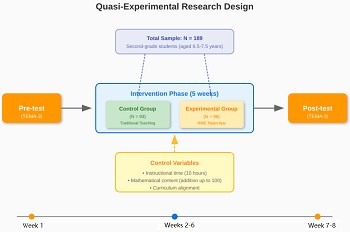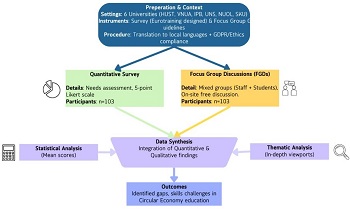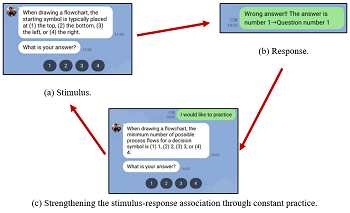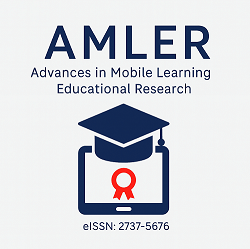2025-12-02
Aims and Scope
 Advances in Mobile Learning Educational Research (AMLER) (eISSN: 2737-5676), published by Syncsci Publishing, is an open-access, international, refereed journal dedicated to advancing knowledge and understanding of how mobile and emerging technologies transform education, supporting the publication of high-quality, innovative research that bridges theory and practice.
Advances in Mobile Learning Educational Research (AMLER) (eISSN: 2737-5676), published by Syncsci Publishing, is an open-access, international, refereed journal dedicated to advancing knowledge and understanding of how mobile and emerging technologies transform education, supporting the publication of high-quality, innovative research that bridges theory and practice.
The journal welcomes empirical studies, theoretical papers, systematic reviews, and meta-analyses that explore the pedagogical, technical, and sociocultural dimensions of mobile learning and educational technology, ensuring relevance to a broad education research and practitioner community. In addition to its established focus on mobile technology’s pedagogical applications, AMLER actively invites research on cutting-edge topics in educational technology, including but not limited to:
- The integration of generative artificial intelligence (AI) in mobile learning environments to support personalized, adaptive, and creative learning experiences.
- The design, implementation, and evaluation of immersive technologies (AR, VR, MR) for mobile learning and their impact on learner engagement and cognitive development.
- Applications of blockchain, learning analytics, and IoT in mobile and ubiquitous learning environments.
- Ethical, legal, and societal considerations in the use of AI-powered tools and mobile technologies in education, including data privacy, algorithmic transparency, and equity.
- Strategies to foster computational thinking, digital literacy, and coding skills through mobile learning and educational robotics, with a focus on K-12 and lifelong learning contexts.
- Studies examining inclusive and accessible mobile learning solutions for diverse learners, including learners with disabilities and those in underserved regions.
- Research on teacher professional development and teacher education for the effective integration of mobile learning and emerging technologies.
- Evaluations of educational policies, leadership practices, and innovation management in mobile and digital education contexts.
- The role of mobile learning in STEM education and interdisciplinary learning, exploring how it can address current and future workforce needs.
- Investigations into learner motivation, engagement, and achievement using mobile learning, including culturally responsive pedagogies and gender equity in EdTech.
- Exploration of the intersections between AI, ethics, and sustainability in mobile learning, examining how emerging technologies can contribute to the UN Sustainable Development Goals (SDGs) through education.
We welcome studies that address specific challenges in improving student outcomes, motivation, and engagement, as well as lessons learned from curriculum and instructional changes driven by educational technology.
Topics of interest include, but are not limited to:
- Mobile Learning in Educational Technology
- Mobile Learning Philosophy and Theory
- Mobile Learning Innovation Management
- Mobile Learning Psychology and Cognitive Science
- Mobile Learning Policy and Governance
- Mobile Learning Evaluation and Impact Assessment
- Mobile Learning Economics and Funding Models
- Generative AI in Mobile Learning
- Immersive Technologies and Mobile Learning
- Mobile Learning for STEM, Coding, and Robotics
- Ethics, Privacy, and Equity in Mobile EdTech
AMLER seeks to serve as a rigorous, high-impact platform for researchers, educators, and policymakers aiming to understand and advance the role of mobile and emerging technologies in education, contributing to the field’s theoretical development while addressing practical challenges across diverse learning environments globally.
Announcements
2025-09-03
Indexed in the ICI Journals Master List database
It is with great pleasure that we formally announce a modest achievement for our journal: Advances in Mobile Learning Educational Research (ISSN: 2737-5676) has successfully passed the evaluation process and been officially indexed in the ICI Journals Master List for the year 2024.
ICV 2024 = 82.67
2024-04-25
Indexed in ERA
The journal Advances in Mobile Learning Educational Research has been located in the database Educational Research Abstracts - ERA (Taylor & Francis Online).
Current Issue
Research Article
This study investigated the effectiveness of a didactic intervention utilizing a custom-developed tablet application, grounded in Realistic Mathematics Education (RME) principles, on second-grade students' addition skills (numbers up to 100). A quasi-experimental design with pre-test/post-test control group structure was employed. The sample consisted of 189 second-grade students (aged 6.5-7.5 years) from four public primary schools in Attica, Greece, during the 2022-2023 school year. Participants were assigned to either an experimental group (N = 96), receiving the RME-based tablet intervention for five weeks, or a control group (N = 93), receiving traditional instruction. Mathematical proficiency was assessed using an adapted version of the Test of Early Mathematics Ability, Third Edition (TEMA-3). Results from paired samples t-tests revealed significant improvements from pre-test to post-test for both the experimental group and control group on overall mathematics scores. However, a Mixed Repeated Measures ANOVA demonstrated a significant Time × Group interaction effect, indicating that the experimental group's improvement significantly exceeded that of the control group. These findings suggest that integrating RME principles with custom-designed tablet applications can substantially enhance young learners' mathematical understanding.
The transition from a linear to a circular economy (CE) is a pressing imperative for Southeast Asia, a region facing rapid industrialization and environmental risks. This study, part of the CEBCAT project, examines the current state of higher education in Indonesia, Laos, and Vietnam with respect to CE and sustainability. The purpose was to identify existing knowledge and ability gaps and instructional problems, thereby informing the development of a master's curriculum in CE and sustainability. Using a mixed-methods approach across six partner universities in Asia, data were collected from 103 individuals, including students, academic staff, and industry professionals. The findings reveal that, although there is a foundational awareness of sustainability, a deep conceptual understanding of the circular economy is limited. Critical skill gaps were identified in practical application, environmental impact assessment, and digital literacy, and a strong preference for experiential learning over purely theoretical or online instruction. However, the study highlights significant institutional barriers, including limited funding, outdated resources, and heavy faculty workloads. Effective CE capacity building requires a shift toward interdisciplinary, practice-based curricula supported by robust industry partnerships and institutional investment.
Mobile Virtual Reality in Mathematics Education: Enhancing Self-Efficacy and Creative Thinking
Mobile Virtual Reality (VR) is increasingly recognized for its potential to make abstract and complex concepts accessible through immersive, portable experiences. In Jordan, students often struggle with mathematics, particularly in topics requiring spatial visualization and the understanding of dynamic processes. This study investigates the role of mobile VR in fostering creative thinking and self-efficacy in mathematics education. A quasi-experimental design was employed with forty-four first year Applied Mathematics students in Amman during the 2024/2025 academic year. Participants were randomly assigned to a control group (n = 21) taught via traditional slide presentations and an experimental group (n = 23) using a mobile VR-based learning module. Statistical analyses, including independent samples t-tests and Mann-Whitney U tests, showed statistically significant differences between the groups (p < 0.05). The results show that mobile VR instruction significantly enhances creative thinking compared to slide presentations. Additionally, learners in the VR condition showed higher mathematical self-efficacy. Effect sizes for creative thinking and self-efficacy were 1.55 and 1.02, respectively, showing a large to very large effect. Thus, mobile VR-based learning is a powerful tool for improving creative thinking and self-efficacy among mathematics students.
Students' views on AI tools can inform the development of a new policy framework for their use in higher education. In this context, this paper examines the views of higher education students at the University of Patras on the practices, benefits, challenges, and suggestions for these tools in academic contexts. A qualitative approach and semi-structured interviews were used to collect the research data, involving 17 humanities students at the University of Patras. Students seem to use AI tools mainly for writing papers and searching for information. They recognize benefits in terms of enhancing cognitive development, while also expressing concerns that need to be addressed, such as the weakening of academic integrity and the tendency towards plagiarism. At the same time, students suggest the need for institutional support for the proper and responsible use of artificial intelligence tools, through training seminars, integrating rules into the educational process, and cultivating digital literacy to promote conscious, creative, and non-passive usage.
This study investigated lecturers' behavioural intention and readiness to adopt artificial intelligence (AI) for academic engagement in federal universities across Northwest Nigeria. Anchored on the Diffusion of Innovation (DOI) theory and the Unified Theory of Acceptance and Use of Technology (UTAUT), a descriptive survey design was employed. Data were collected from 759 lecturers using the AI Technology Adoption Questionnaire (AITAQ) and analysed with descriptive statistics and Spearman's Rank Correlation. Findings revealed that lecturers demonstrated moderate levels of behavioural intention, readiness, and acceptance of AI, with an overall weighted mean of 3.43. Socioeconomic status had a weak, insignificant effect on AI adoption, whereas institutional support had a significant, though modest, positive effect, highlighting the importance of enabling environments over financial capacity. The study concludes that professional motivation, institutional structures, and perceived usefulness outweigh personal financial resources in determining AI adoption, with practical implications for policymakers to strengthen infrastructure, training, and leadership support for sustainable AI integration in higher education. These findings contribute to the growing body of knowledge on AI integration in education, providing practical information for educators and policymakers seeking to enhance academic engagement through AI innovations.
This article examines Nepali higher education (HE) teachers' and students' experiences and perceptions of online exams and students' cheating on online assessments during the COVID-19 pandemic, when HE course cycles--including assessments--were conducted online.The study data were collected using semi-structured interviews with HE teachers and students.The study findings illustrate that while both teachers and students expressed positive perceptions of online exams, the increasing prevalence of cheating on online assessments imposed an added layer of challenges to academic integrity and assessment validity for Nepali HEIs in the wake of the COVID-19 pandemic.The findings offer new insights into the existing body of knowledge on academic dishonesty in Nepal and reveal significant differences between teachers' and students' attitudes towards proctored online exams, as well as the underlying reasons behind students' academic misconduct.We argue that the validity of assessments during the pandemic was more questionable than cheating on online exams itself.
Certification-based vocational education often emphasizes practical training, yet repetitive subject-based learning tasks place a heavy burden on teachers and reduce student motivation. To address this challenge, this study examined the integration of a gamified chatbot into cognitive content instruction for the Level B Computer Hardware Fabrication certification. A quasi-experimental design was implemented across three academic years, involving a control group (conventional instruction), an experimental group using a non-gamified chatbot, and another using a gamified chatbot. Over an eight-week intervention, participants completed pre- and post-tests to measure learning effectiveness, while learner satisfaction was assessed through a validated questionnaire. Results from ANCOVA revealed that the gamified chatbot group achieved learning outcomes equivalent to teacher-led instruction and significantly outperformed the non-gamified chatbot group. Post hoc tests confirmed large effect sizes favoring gamification. Learners also reported greater satisfaction, particularly in reduced boredom and improved alignment with learning preferences. These findings demonstrate that a gamified chatbot can effectively function as a mobile cognitive content instructor, sustaining motivation, enhancing learning outcomes, and alleviating teacher workload in certification-oriented education. The proposed model is scalable and holds global relevance, offering adaptability to other vocational certifications, STEM training, and content-intensive learning contexts.
| eISSN: 2737-5676 Abbreviation: Adv Mobile Learn Educ Res Editor-in-Chief: Prof. Nikolaos Zaranis (Greece) Publishing Frequency: Half-Yearly Article Processing Charges (APC): 0 Publishing Model: Open Access |




 Emmanouil Skordialos, George Baralis, Nicholas Zaranis
Emmanouil Skordialos, George Baralis, Nicholas Zaranis







